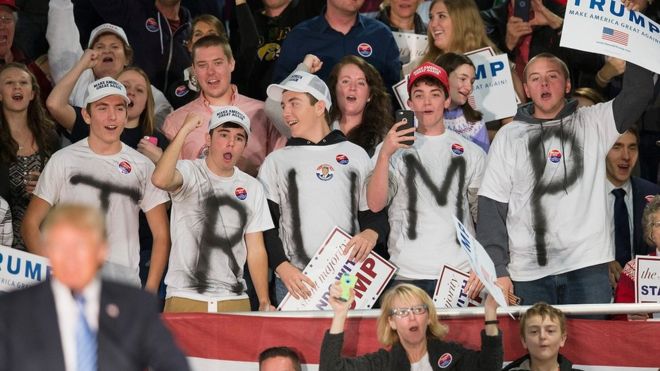No opinion has been altered by an insult regardless of the insult’s accuracy. Speaking truth to power is the first prescription in the resistance playbook, but truth is inefficient when addressing passionate angst. Emotional pain brought President Trump to office. We liberals need a communication strategy that speaks to universal unity and the virtue of empathy in the same way that Trump’s campaign spoke to governmental discord and bipartisan hostility.
In March 2016, I wrote in Madison365: “When comparing two tragic tales, how does one convincingly insist that black pain is more deserving of advocacy? History, facts, truth, logic, and argumentation: these are inefficient when addressing purely emotional pain. The ardent Trump supporter will not be swayed by your truth. With that said, we have two choices: write them off or find a new way to discuss systemic racism.” America decided to write them off. We liberals must find a new way to discuss issues with Trump supporters by taking them seriously.
American liberalism is in a dark period. Do we obstruct President Trump as ardently as possible, becoming hypocrites who once panned conservatives for obstructing President Obama? Do we resist strategically while risking the normalization of the most unqualified President in United States history? The Republicans control all three branches of government. To what extent is resistance even a possibility? And does resistance ultimately perpetuate the trend toward bipartisan animus that began during Bill Clinton’s tenure?
We need to find a new way to discuss systemic racism with people who voted for Trump. Granted, we tried. Hillary Clinton was the wrong avatar, an imperfect embodiment of values which are accurately described by conservatives as divisive. Discussing racial inequality is naturally divisive. We liberals insist that our culture is inundated with racism, sexism, Islamaphobia—on and on, the list of Clinton’s deplorables. We insist that humans must seek enlightenment about racial issues, but simultaneously bemoan how racism is too pervasive, too systemic to be changed in a single generation.
For conservatives, who have an individualized view of racism, this is a troubling worldview. We liberals have muddied our argument by calling conservatives “racists” as individuals while defining “racism” as systemic and social. For those without college degrees, these distinctions are banal. So I ask myself — at the risk of offending my most militant friends — why do we liberals keep calling conservatives racist? Is it accomplishing a goal?
Truth holds little weight in 2017. Enacting social change requires more than speaking truth to power. Even if every racist you label a racist this year is very, very racist, what have you accomplished? It feels good to feel smarter than the people in power, but being correct is different from doing right. Jill Stein was a moral candidate, and voting for her may have been “correct,” but it was not right because it helped Donald Trump to be elected. The strategic choice is often unpalatable, maybe morally offensive to some, but speaking truth to power is not working. It is time to strategize.
Trump voters felt deprived of dignity. We liberals responded by telling them that black people have harder lives. Insisting that an impoverished white voter is more privileged than our black President may be correct, but it is not right. No strong coalition was ever built by guilt. No person defines their own life as easy.
American liberalism relies too heavily on critical thinking to capitulate to “alternative facts,” so adopting Trump’s strategy wholesale is not tenable. We need unity without losing diversity. How do we discuss the truth without alienating voters? We appeal to materialism. President Trump acknowledged one universal truth during his campaign: every self-interested voter believes they have gotten the sh*t end. Hillary Clinton assumed that the Obama-induced status quo was working for her base, but no one is satisfied with the status quo. Not now, not ever. Every voter wants more.
Bernie Sanders laid the groundwork for a coalition of the working class. President Trump has used “us against them” – the “good Americans” against undocumented immigrants and ineffective politicians. It worked. Let us do the same – American workers against American owners. Ever-increasing automation and multinational corporations set the stage for the upcoming showdown. In my hometown of Kenosha, Wisconsin, our residents feel lucky to get an hourly wage from Amazon when Chevrolet provided a salary and benefits only one generation ago. The new normal will require a broad coalition.
People of color are right to be skeptical of this type of unity. Historically, white workers have always been willing to abandon people of color when it becomes financially convenient. We liberals have no choice — we must do better for each other. Trump’s success is undergirded by racism, but as we liberals acknowledge, racism is too pervasive to resolve in the course of a single generation. The urgent need to win the mid-term elections and the Presidency in 2020 necessitates calculated rhetoric, coalition building, and strategic resistance. Trump’s supporters do not see themselves as racist. Let us begin conversations that start with their concerns. We may discover that our concerns are more common than we realized.










